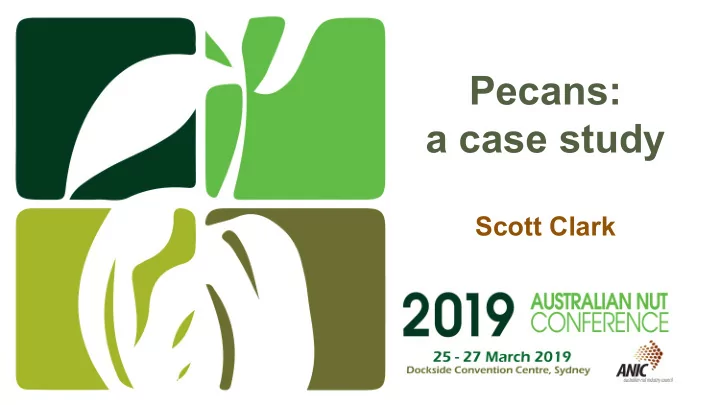

Pecans: a case study Scott Clark
My Story… • My pecan farm is in Northern NSW – 5,000 trees • President Australian Pecan Association (APA) for the last 10 years • Seeing rapid growth in the industry… • The industry is taking off!
Growth of pecan industry… • Estimates of at least doubling the number of trees in the ground over the next 5 years • Will take pecan production in Australia from the current 2,000 – 3,000 tonnes of NIS to over 6,000 tonne of NIS
Production areas… • The majority produced by Stahmann Farms under irrigation in the Gwydir Valley, east of Moree in northern inland NSW • Smaller scale production extends all the way up the NSW coast from the Hunter Valley in the south to Tweed Heads in the north. • Pecans are also grown in Central Queensland around the Burnett region and south to the NSW border. • Small plantings also in SA & WA.
The tough nut… • Pecans are very hardy • They thrive in a wide range of soil and climatic conditions. • Their native habitat is the Mississippi River Delta in the USA • They are extremely long-lived and remain highly productive for more than a century, making them a genuine long-term investment.
Pecan growing requirements… • 400 Chill Units (<7 Celsius ) • 1500+ Heat Units (max + min /2)-13 • 180 Freeze Free Days ( min >-4 Celsius) • 1300mm of rainfall year • 60 – 125 mm /week per hectare during critical nut development (Sept – Feb)
Soil requirements for growing pecans… • Pecans grow best in alluvial soils that are deep and well drained. • Pecan trees can be grown on any soil that allows water penetration to a depth of 2m. • Water should be able to move down through the soil at a reasonable rate and the soil should not have any layers which would prevent water from draining downward. • Pecans have a low tolerance of salt in soils, groundwater or irrigation water.
Stages of nut development… • November – January : “Water • June-August : Dormancy Stage” • September : Bud break • January – February : Shell • October : Pollination Hardening
Stages of nut development… • February – April: Kernel development • April: Shuck split • April - June: Harvest
Pecan yields… • Pecans varieties start bearing at different ages • Precocious varieties tend to start setting nuts in year 4-5. Generally yields are: • Year 5 – 1-2 kg per tree • Year 6 – 2-4 kg per tree • Year 7 – 6-8 kg per tree • Year 8 – 10-12 kg per tree • Year 10 – 15 kg per tree • Year 15 – 15-20 kg per tree • On 10m x 5m spacing the trees should be at maximum yield by year 15. • Maximum yield on good fertile ground properly shaped and hedged yields of up to 4000kg/Ha are possible. • 3 Tonnes / Ha are the standard in the USA. • Current Australian average is approx. 2-2.5 tonnes /Ha
Clean & green… • Australia is very lucky in not having any of the major pecan pest & diseases found in other countries • Australia produces the cleanest greenest pecans in the world • Majority of pecans produced in Australia are done so without the use of chemicals • Major advantage of Australian pecans
Focused on quality… • Australian pecan growers focused on producing top quality product • Industry developing best practice guidelines • Biggest producer Stahmann Farms operates a world class processing facility focused on quality.
Markets… • The bulk of Australian production is sold as kernel for domestic consumption with distribution split between retail and manufacturing channels. • Stahmann Farms operates Australia’s largest pecan processing plant in Toowoomba, Qld from which it supplies in-shell and kernel products to domestic and international markets. • Other smaller processors supply mostly local markets.
Markets… • Pecans constitute less than 5% of world tree nut trade • Their consumption is still mainly concentrated in the US, where they are a native nut. However, demand in Asia, Europe and the Middle East is growing. • The pecan market has been strong in recent years, especially since the entry of China to the world market in the early 2000s.
Pecans - at the heart of healthy living… • Like all tree nuts, pecans have many, many marketable health benefits… • Pecans exceptionally high level of antioxidants (one of the highest of all natural food products) is most noteworthy. • The ANIC Nuts for Life campaign continues to play an important role in bringing such benefits to the attention of Australian consumers & health professionals.
Follow us on social… • Australian Pecan Association – group page. Don’t have to be a member to join. Our industry page all are welcome…just no advertising! Good place to share information, ask questions of growers etc. • Australian Pecans – our consumer page. For pecan recipes, sharing Nuts for Life health & nutrition information and other consumer oriented content.
Thank you…questions?
Recommend
More recommend